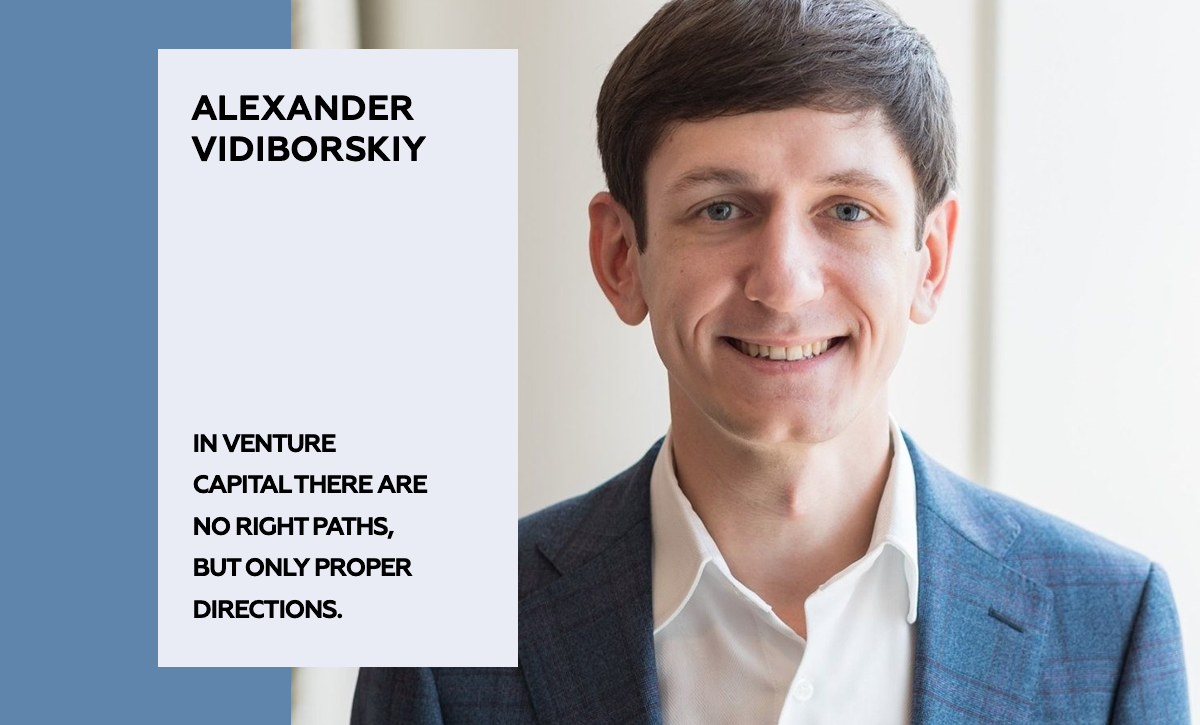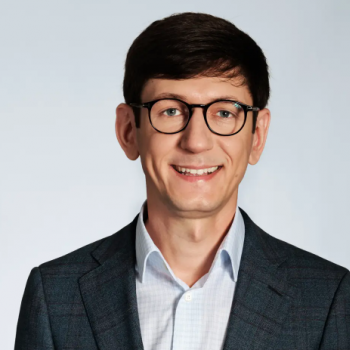
It is the first interview for the new “Network2Moldova” column. The column has two main goals: The first one is to acquaint Moldovan startups and IT companies with the practices of international IT industry players. Why? The answer is simple. The key to success in IT consists in scaling and integrating into the global market. Especially for a country with such a small market as Moldova. The second purpose is to create an informal circle of communication and business contacts for the Moldovan IT community. No professional will refuse a new business contact if he sees behind it some potential. Personal acquaintances and recommendations have been and still are efficient tools for doing business.
Today's interview with Alexander Vidiborskiy is not the first with him. Shortly, Alexander was born in Ungheni, grew up in Chisinau, and now works as a principal at Atomico Venture Fund.
The Atomico Venture Fund was created by former Skype founder and CEO, Niklas Zennstrom, and manages about $3 billion in assets with the help of a team of around 60 people.
The fund is now working with a new tranche of investments - $820 million - that Atomico finished raising in January 2020.
What does Alexander do at Atomico as a principal? The whole investment cycle - searching for promising projects, analyzing, negotiating investment terms, presenting the project to a committee of investors, and, if the project is invested in, helping its development.
Hello, Alexander. Let's start our dialogue about Atomico "from the end", with recent successful "exits". Why? To present the range of the fund's activities and understand what directions in IT are promising now. So, what are Atomico's recent striking "exits"?
I will mention just two of them: the first one is one of "our" companies sold out to Autodesk-y. The company's product is software for developers. The software takes automatically a lot of factors into account for building projects. Factors such as noise level, wind, sun, current building development, and so on. With the help of artificial intelligence, designers can reduce design time while maximizing "useful" factors. For example, it is clear that apartments with windows on the sunny side sell better and are more costly. The software helps to design the building so that you get the maximum number of apartments with a given parameter.
Sounds like a solution for a highly specialized application problem.
The vast majority of startups start this way. An excellent example is our recent second "exit". In the area of... let's call it HR. The company has developed a solution that helps you analyze various personnel surveys in your company. This way, you have measurable indicators for personnel management while constantly keeping your hand on the pulse of what's going on in the company.
Sounds kind of trivial, "survey automation". And there are millions behind this direction, too?
It may sound trivial, but it's not easy to implement at all. The advantage of this company was that it was able to collect large industry data sets on a variety of issues. And when you get a report on a survey of your staff, you can also compare it with the results of similar surveys in other companies. You only have access to impersonal, average information. No personal data. Nevertheless, the "hospital temperature" for entrepreneurs is also fundamentally important. If your employees are 6 points satisfied with the support during the pandemic, and the industry average is 9, it's a good time to think about it or you'll start losing key employees.
Listening to you, I understand two things better. The first is that you can build a technological startup in almost any niche. The important thing is to know it thoroughly. The second is collecting data. If you have your database, which you constantly replenish and update, you can always build a business on it. But now I'm even more curious about the answer to the next question. You named two recent successful "exits." What are Atomico's "favorites" right now? I did my homework, and I counted 89 startups on your site.
One of the most interesting latest investments is in Infarm. It's just an example of a revolutionary shift in thinking. There are fresh organic greens that consumers are increasingly looking for, and there are supermarkets where they go to get their groceries. Why not combine the need for greens and the capabilities of supermarkets? Infarm suggested creating vertical farms to grow greens right in supermarkets. They provide many solutions at once. Organic vegetation in the supermarket, plants sold as food, minimized delivery costs, and, most importantly, it fights climate change. Delivery cars do not have to drive for greenery, and, consequently, harmful emissions into the atmosphere are reduced. The efficiency of this system is increased since it is controlled by AI, which analyzes a large dataset on the success of a particular growth model. Hiro Tamura, who has been with Atomico almost since its foundation, invested in this project. He certainly has a great instinct for promising and revolutionary projects.
I continue to be surprised by the wide range of Atomico's interests. By the way, what kind of investments have you been involved in?
I would say Qatalog. It is an office application, the potential future of office work. Today, large offices use dozens of software for work - Slack, Microsoft, Google Drive. Time is wasted searching for and transferring information from one tool to another. Qatalog creates a single hub for managing business processes in the office, eliminating the duplication of activities and optimizing communication with the team. The changes are not just quantitative, but qualitative. Though, it's better to try it out yourself.
God loves the trinity. Let's do another project. Honestly, I can't stop when people tell me about startup ideas. It excites the imagination...
A third one? Okay. This one is from a different area, the junction of software and hardware - LabGenius. The project is especially relevant in the era of pandemics and the risks of new viral infections. The startup can dramatically reduce the time it takes to create new drugs. Pharma companies have already established certain traditional cycles of drug development. To describe it in simple words, it is the trial and error method, where each cycle takes months if not years. However, LabGenius takes a different approach to "designing" drugs. First, the drug is designed in the virtual world by AI, then robotic laboratories, without human involvement, test the drug. Afterward, the test information is sent back to the "thinking" software, and finally, the development scientists receive "half-finished" solutions for review. The final decision is still taken by a human, but the process of working on a new drug is accelerated and made cheaper by leaps and bounds.
Alexander, let's go from the general to the specific. There are no venture capital funds in Moldova. Your position is not as clear to our readers as well as a "programmer" or a "marketer". In a nutshell, what exactly do you do at Atomico?
In venture, the career ladder usually looks like Associate - Senior Associate - Principal - Partner. Any investment team member will be involved in almost the entire transaction cycle and subsequent investment management, though, at each stage of career development, there are more responsibilities and more expectations from you. In general, there is this comparison of investment professionals to "truffle bloodhounds". Truffles are looked for underground; one way to find them is with the help of dogs or pigs, specially trained to smell these expensive mushrooms. It is exactly what our job is like. You spend a long time digging through information, running around, processing hundreds of sentences, disparate facts, and observations in your head, and then when you sense something that might talk about great potential, you start digging deeper. You bring an idea or a startup to your fund and show its prospects. If the fund accepts the idea and invests in it, you "lead" this company further, helping it to grow until its "exit".
Lest you are overwhelmed with a lot of offers, like "my friend and I came up with one idea...", what is the level at which a startup comes to the attention of a fund like Atomico?
There is no specific number per se. Although, of course, Atomico is interested in investments averaging $5m-$20m. The main thing is for the startup to have a breakthrough idea. I will say it with a bit of pathos - an idea that changes the world. Of course, the startup must already be generating revenue (for example a million dollars a year, as proof of its viability). Let's consider this not a filter for Moldovan startups, but a benchmark...
You know, I want to emphasize one crucial thing. Not every business has to look for venture capital investment. For example, you and I have known each other for five years. Watching you, I can say that you are a classic example of a Life Style business. You are inseparable from your ideas and your company. You need to decide on your future and the future of your company. It doesn't mean that you cannot have a big company. But when you make a big investment, you must be aware that now YOUR company will have a board of directors and a management board, where you will be just one of the board members. The more the company grows, the smaller your stake in it will become. It is not worse or better than a LifeStyle business. It's just a different way of doing business. One has to be ready for it.
I'm glad that you voiced that. Back to those startups that are willing to look for investment. You process a lot of information daily. What trends should Moldovan startups look out for?
A good phrase that I like a lot is, "In Venture, there are no right paths, but only right directions." There is an infinite number of niches where you can grow a new unicorn. Maybe my advice sounds trivial, but if you want to build a new unicorn, you have to attack the big markets with "fat" ideas. What you are solving should be a big problem for humanity today - not a tiny improvement, but a radical change.
Let's draw a line under this advice for today's interview. We talked about such over-the-top matters, so let's finish with something earthly and relatable to everyone. How do you live the lockdown up there in London? I never thought such a word existed and that it would transform the way the whole world lives.
An earthly detail? I started baking bread at home during the lockdown. One can hardly find good bread in our "neighborhood", so, now, when my head is overloaded, I bake bread. By the way, I'm not the only "baker" at Atomico...
Bingo! On the smell of fresh bread, we can end this discussion.










